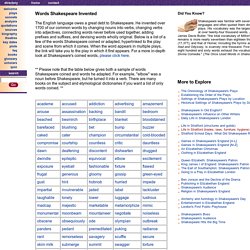

45 Everyday Phrases Coined By Shakespeare. April 23rd is generally considered to be a good day to celebrate the birth of England’s greatest poet and playwright, William Shakespeare.

This is partly because there are no records of his birth—although he was baptized on April 26—and partly because he died on April 23 (and April 23 is St. George’s day, patron saint of England), so there is a pleasing, almost poetic symmetry about the way the dates line up. Today is the 450th anniversary of the day Shakespeare was (possibly) born, and in tribute to his astonishing contribution to the English language, it’s time to for a challenge. One that will suit all comers, faint-hearted (1) or not. Below there are 45 common expressions that were either coined by Shakespeare or popularized by him (at this vertiginous historical remove, it’s hard to be certain what was created and what was pinched from his immediate surroundings). That’s all, just five and then you’ll be fancy free (3). The game is afoot (5! “All our yesterdays”— (Macbeth) Words Shakespeare Invented. Words Shakespeare Invented The English language owes a great debt to Shakespeare.

He invented over 1700 of our common words by changing nouns into verbs, changing verbs into adjectives, connecting words never before used together, adding prefixes and suffixes, and devising words wholly original. Below is a list of a few of the words Shakespeare coined or adapted, hyperlinked to the play and scene from which it comes. When the word appears in multiple plays, the link will take you to the play in which it first appears. For a more in-depth look at Shakespeare's coined words, please click here. ** Please note that the table below gives both a sample of words Shakespeare coined and words he adapted. For more words that Shakespeare coined please see the Comprehensive Etymological Dictionary of the English Language by Dr. How to cite this article: Mabillard, Amanda. More Resources. The influence of Shakespeare on everyday English. Shakespeare's Influence on the English Language. Culture - How Shakespeare influences the way we speak now.
If you missed Shakespeare’s 450th birthday, you can be sure he’d have had a zinger of a putdown to sling your way.

Or better yet, a whole string of them. “Thou art a boil, a plague sore, an embossed carbuncle in my corrupted blood" might just do it, borrowed from King Lear railing against his daughter, Goneril. Or perhaps he’d settle for more aloof damnation, along the lines of Orlando’s insult to Jaques in As You Like It: “I do desire we may be better strangers.” That isn’t a wish likely to be granted to Shakespeare any time soon. Yes, his 450th birthday has been and gone already, but it’s worth noting that all over the world, people paused to acknowledge it in the first place. Of course, fellow artists readily draw on him for paintings, operas and ballets.
And what of Shakespeare's other plays? Famous phrases These catchy titles barely gesture to Shakespeare's influence on the minutiae of our lives. Allow yourself to “gossip” (A Midsummer Night’s Dream), and you’re quoting him. Shakespeare &The Development Of Early Modern English. Shakespeare is probably the most famous of all Englishmen.

One of the things he is famous for is the effect he had on the development of the Early Modern English language. For example, without even realising it, our everyday speech is full of words and phrases invented by Shakespeare. He was able to do that because English was changing as people modernised it in their normal workaday speech. One of the ways the grammar was changing was that inflectional endings (suffixes that indicated the word’s grammatical functions in the way that many modern languages still have) had largely disappeared.
Modern English was becoming wonderfully flexible and that was the background to the Renaissance explosion of the inventive language we see when we look at the poetry of the time. Writers were able to invent new uses for words with great freedom. There was a huge inflow of other European vocabulary into the English language as a result of Renaissance cross-pollination.